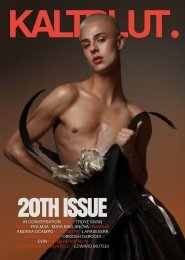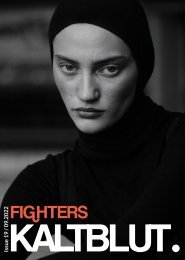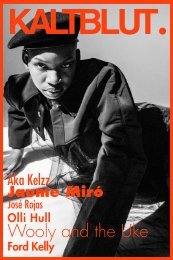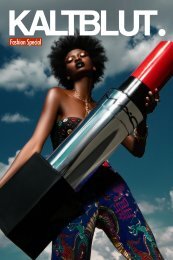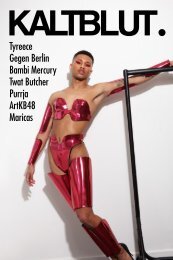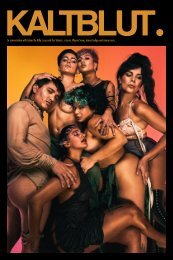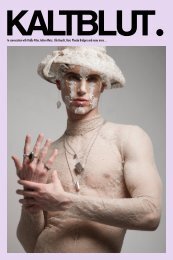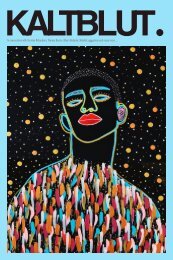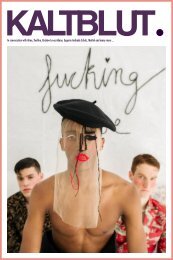Issue 21 – In Conversation with .. 10!
Welcome to the 21st issue of KALTBLUT. In conversation with Daniel Zillmann, YuYu, ALLIE X, Joseph W. Ohlert, Kid Simius, Emilio, Branko Popovic, Tariq Alsaadi, BEC, Dennis Grigorev, Hümeyra Demircioğlu, BKLAVA, Anita Vieiro and SISSY MISFIT. 404 pages filled with art, fashion and music.
Welcome to the 21st issue of KALTBLUT. In conversation with Daniel Zillmann, YuYu, ALLIE X, Joseph W. Ohlert, Kid Simius, Emilio, Branko Popovic, Tariq Alsaadi, BEC, Dennis Grigorev, Hümeyra Demircioğlu, BKLAVA, Anita Vieiro and SISSY MISFIT. 404 pages filled with art, fashion and music.
You also want an ePaper? Increase the reach of your titles
YUMPU automatically turns print PDFs into web optimized ePapers that Google loves.
Alexis: Agreed. Design processes are often invisible to<br />
consumers, and validation requires reflection and direct<br />
interaction <strong>with</strong> customers. Customers are the ones who wear<br />
the garments. They know how the clothing feels on their bodies.<br />
It's highly subjective, which is why retaining the craft of tailoring<br />
in a fashion label is important.<br />
There will always be customers who want to adjust things to<br />
enhance their experience <strong>with</strong> clothing even more. With our<br />
background, we can actually work as catalysts. However, this<br />
approach isn't feasible in a fashion label, making it challenging<br />
to find a place in the fashion industry. I love clothing. I love<br />
making clothing. But finding my voice amidst the noise of 'how<br />
you should run your label' is extremely difficult.<br />
Where or how would you position yourself?<br />
Svea: Wait, I have another question: Your transition from<br />
tailoring and fashion design, both fields deeply rooted in the<br />
technical, hands-on production of clothing meant for the<br />
protection of the body, to a field of study that explores<br />
a completely different perspective. How did that happen?<br />
Alexis: How did it happen? I think it’s again a matter of<br />
positioning. The way people act in the fashion industry is so<br />
contrary to my upbringing on a farm. I had this need to let<br />
these values from my childhood flow into my work and fashion.<br />
I find it so important, that these bodily, intimate, and caring<br />
values, and how we deal <strong>with</strong> society, must also flow into our<br />
work as fashion designers. Especially because we influence the<br />
subjectivity of people through our designs. This indirect process<br />
wasn't clear to me before, and I followed my intuition. However,<br />
I also faced many disappointments along the way.<br />
The Master's in Critical Fashion Practice at ArtEZ feels like<br />
a continuation of these thoughts and positioning. It's extremely<br />
helpful in finding my place and raises many questions. How can<br />
we play <strong>with</strong> the discrepancies in our lives? How can I somehow<br />
liquefy the structures and find new ways to navigate through<br />
this barrier? How can we reach out to each other and arrive at<br />
a point that is socially more valuable than something as<br />
alienating as the fashion industry? Here, one of the approaches<br />
is again the other extreme, to create it more humanly by<br />
alienating oneself, as you do, and imagine a new world.<br />
To invite people and realize, wait, I can participate here, my<br />
voice is heard, and I feel seen. And I think such approaches are<br />
totally important.<br />
Svea: Thank you, I’m glad that you feel that way.<br />
It might be my way of rebelling against societal norms<br />
and boundaries and the desire for authenticity and respect—not<br />
just for individuals but for our whole<br />
environment.<br />
You’re not a better person just because you happen to meet the<br />
beauty standard.<br />
Another thought that was particularly new to me, came to me<br />
during the design process for the sculptures’ clothing:<br />
How do I dress a character?<br />
To consider how someone feels and what this character needs<br />
to feel comfortable. So, looking at clothing as a form of support<br />
and expression for each person’s inner world. This made<br />
me realize once again how fashion shapes not only the outer<br />
appearance but also reflects and supports personality, moods,<br />
and needs. Somehow I feel that through the sculptures I’m much<br />
closer to people.<br />
But as you already mentioned, not only the output of the<br />
fashion industry shows the alienation from people, but<br />
also the way the entire fashion industry operates.<br />
Unfortunately, I have had so many negative experiences<br />
concerning mutual respect. Around the end of the 2nd<br />
year during my studies, I wasn’t sure if I really wanted to<br />
work under ego power struggles for the rest of my life.<br />
I think we both have had similar experiences because we<br />
have seen the world of fashion from different perspectives.<br />
The development of the relationship and hierarchy<br />
between fashion designers and craftsmen to this day still<br />
surprises me. The complete devaluation of craftsmen. This<br />
led me to seek the connection between fashion and art.<br />
Because I needed to show a different kind of interaction,<br />
like a small alternative society. Within this society is a<br />
certain safety to experiment. I like that.<br />
Alexis: So, we're back to my favourite critique, capitalism.<br />
Yay! But honestly, I don't even feel like talking about it<br />
anymore because I just think, burn this shit down.<br />
However, I do believe that people who have the skills to<br />
implement things and inspire others to envision the world<br />
differently pose a threat to the concept of capitalism. Yet,<br />
once the detachment from clothing to craftsmanship is<br />
achieved, there's also a lack of understanding of how the<br />
clothing we produce influences society and individuals.<br />
Svea: Another question, because you keep emphasizing<br />
humanity: How do you see artificial intelligence in the<br />
fashion sector?<br />
365




